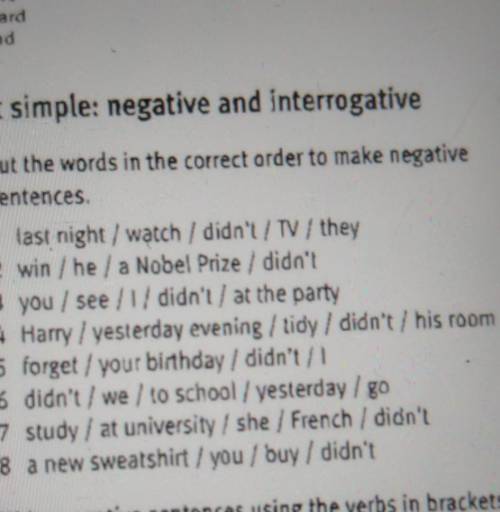Past simple: negative and interrogative 4 Put the words in the correct order to make negative
sentences,
1 last night / watch / didn't/ TV / they
2 win /he/ a Nobel Prize / didn't
3 you / see /l/ didn't / at the party
4 Harry / yesterday evening / tidy / didn't / his room
5 forget / your birthday I didn't //
6 didn't / we/ to school/ yesterday / go
7 study / at university / she / French / didn't
8 a new Sweatshirt / you / buy / didn't
5 Write negative sentences using the verbs in brackets.

Другие вопросы по теме Английский язык
Популярные вопросы
- 149. Прочитайте текст и озаглавьте его так, чтобы заголовок отражал основную...
1 - 2 Отрывок можно разделить на две части . Как складываются взаимоотношения...
2 - Исследование функций на монотонность...
3 - 7 тапсырма қазақ тілі жұп құрап оқылым мəтініндегі монлогті диологке айналдыр...
1 - Складзiце i запiшiте невелiкi текст-апавяданне Як я выконваю дамашняе заданные...
1 - Напишите , сочинение про Шульганташ!...
2 - Списать словосочетания, и объяснить написание Н-НН пользуясь алгоритмом.Образец:...
1 - Новая история 8кл надо написать про~~~ государство России в 17--- 18 в . окончание...
2 - 2 б) 5 санының еселіктері болмайтын сандарды таңдап жазыңыз....
1 - Медунка доберати дієслова у формі минулого часу, виділити закінчення...
3
To form a negative sentence in past simple, we need to use the auxiliary verb "did" in the past simple form, followed by the subject "they," and then the base form of the main verb "watch."
2. He didn't win a Nobel Prize.
Similarly, we use the auxiliary verb "did" in the past simple form, followed by the subject "he," and then the base form of the main verb "win."
3. You didn't see Lisa at the party.
Again, we use the auxiliary verb "did" in the past simple form, followed by the subject "you," and then the base form of the main verb "see."
4. Harry didn't tidy his room yesterday evening.
Once more, we use the auxiliary verb "did" in the past simple form, followed by the subject "Harry," and then the base form of the main verb "tidy."
5. I didn't forget your birthday.
We use the auxiliary verb "did" in the past simple form, followed by the subject "I," and then the base form of the main verb "forget."
6. We didn't go to school yesterday.
Using the auxiliary verb "did" in the past simple form, followed by the subject "we," and then the base form of the main verb "go."
7. She didn't study French at university.
Employing the auxiliary verb "did" in the past simple form, followed by the subject "she," and then the base form of the main verb "study."
8. You didn't buy a new sweatshirt.
Lastly, we use the auxiliary verb "did" in the past simple form, followed by the subject "you," and then the base form of the main verb "buy."
To summarize, in past simple negative sentences, we place the auxiliary verb "did" in the past simple form before the subject, and then use the base form of the main verb.